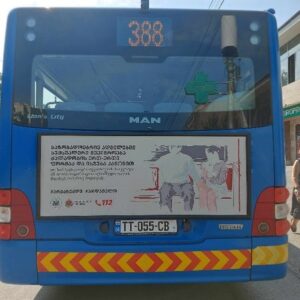In an effort to tackle gender-based violence and harassment across Tbilisi’s public transport network, the EBRD has provided financial and technical support to Tbilisi Transport Company – the operator responsible for managing public transport services in the city – to help them set up a tracking system to address incidents on the city’s metro and bus routes.
Mariam Patsatsia, Community support coordinator | 11 October 2024

The EU’s Gender Action Plan for Georgia, disclosed in March of this year, provides information on several other projects that the European Bank for Reconstruction and Development (EBRD) will be financing with the aim of promoting gender equality in the country.
Why does establishing a tracking system matter?
According to a 2023 UN Women study, one in four women in Georgia have faced sexual harassment, with the majority of incidents occurring on the streets, in alleys (41.2 per cent), or on public transport (28 per cent).
The situation is even more concerning for LGBTIQ+ women, especially transgender women, who often navigate public spaces in fear of harassment or physical violence.
The report found that women in Tbilisi are disproportionately affected, with 51.7 per cent reporting incidents compared to those in other urban and rural areas.
Research and surveys have consistently revealed high levels of harassment across Tbilisi’s public transport system, with younger women bearing the brunt of the abuse. The vast majority of these incidents remain unreported, leaving victims without recourse.
Green Alternative and Bankwatch have consistently raised concerns about the sexual harassment and gender-based discrimination that pervades Tbilisi’s public transport network.
We continue to urge the Tbilisi authorities and the international financial institutions that fund transport projects in the city to proactively include women as well as sexual and gender minorities in designing solutions to this problem.
Campaign misses the mark
In June, Tbilisi Transport Company launched their campaign, supported by the EBRD, publicising the availability of the tracking system for passengers to report incidents. However, the campaign, still ongoing, fails to explicitly convey the key message that women – or indeed any passengers – can report incidents of sexual harassment via the hotline.
Let’s not forget that, according to the EBRD, the original purpose of establishing the tracking system was to specifically address gender-based violence and harassment on Tbilisi’s metro and bus routes.
However, in a July article on the EBRD’s website, the bank talked up its progress enhancing Tbilisi’s public transport system, claiming significant strides in passenger safety and highlighting EBRD-funded projects that ‘promote safety for all thanks to an incident tracking system’.
In particular, the bank pointed to its role in helping Tbilisi Transport Company upgrade the hotline to field phone calls on infrastructure issues and reports of harassment on public transport.
Reference was also made to the introduction of new ‘rules and regulations’ for handling reported incidents, accompanied by a city-wide communications campaign urging passengers to make use of the hotline.
The taboo of harassment
This omission severely undercuts the very objective of the tracking system, leaving those most at risk of sexual harassment – women and gender and sexual minorities – unaware that they have a resource to seek help. But is there another reason a targeted campaign explicitly encouraging women to come forward without fear or shame and report incidents of sexual harassment wasn’t taken up?
In Georgia, party politics, particularly the ruling party’s influence, pervades all aspects of public life. From ministries and municipalities to agencies and state-owned enterprises, the party strives to maintain control wherever possible.
This means that public-facing activities, including information campaigns, must always toe the party line. With October’s parliamentary elections on the horizon, control (and self-censorship) is being exercised more stringently than ever.
Georgian Dream – the ruling party in Georgia – has made the protection of traditional ‘family values’ one of the central pillars of its election campaign. This has led to hate-mongering against the LGBTIQ+ community and the steady erosion of women’s and minority rights.
In this climate, addressing the widespread issue of sexual harassment on Tbilisi public transport through a public outreach campaign would directly contradict the party’s carefully crafted narrative. Any meaningful conversation about gender-based violence would risk running counter to the government’s focus on conservative, populist messaging.
What a difference a year makes
To illustrate the point, we only have to compare the 2024 EBRD-backed public campaign with a similar initiative launched in summer 2023 by the interior ministry and backed by the US embassy.
While the latter openly addressed sexual harassment, this year’s watered-down campaign remains conspicuously silent on the issue. This discrepancy speaks volumes about the selective messaging at play and how the key issue has been avoided.


The message on the first advertisement reads: ‘Sexual harassment in public spaces is a form of violence and is punishable by law. If you are a victim of sexual harassment or have information about such an incident, report it to the police. #Dontkeepsilent #Donthideit’
The message on the second advertisement reads: ‘If you encounter situations that put you or other passengers at risk, reach out to us. Let’s create a safe environment together.’
EBRD oversight in short supply
The EBRD has failed to fulfil its role in ensuring that the incident tracking system meets its express purpose of tackling gender-based violence and harassment by clearly communicating that reporting harassment is both possible and encouraged.
Given the prevalence of gender-based violence on public transport, there’s no point in establishing a tracking system if it doesn’t ensure that women as well as gender and sexual minorities are aware of its existence and understand they can use it to call out sexual harassment.
Unfortunately, in conservative societies like Georgia, reporting sexual harassment often carries with it the weight of judgment, stigma, and shame. For a tracking system to be effective, it must be accompanied by a campaign that actively contributes to breaking down these barriers and fosters a supportive environment.
Empowering these groups to report incidents and ensuring their concerns are taken seriously is critical for creating a safer public transport system in Tbilisi.
————
On 8 October, Bankwatch together with Green Alternative, Gender Budget Watchdog Network and Sarajevo Open Centre organised a webinar entitled ‘Combatting gender violence in public transport in the Western Balkans and South Caucasus’. Watch the recording here.
Never miss an update
We expose the risks of international public finance and bring critical updates from the ground – straight to your inbox.
Institution: EBRD
Theme: urban transport | gender
Location: Georgia
Tags: EBRD | cities for people | gender | public transport | urban transport
